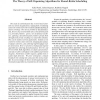Free Online Productivity Tools
i2Speak
i2Symbol
i2OCR
iTex2Img
iWeb2Print
iWeb2Shot
i2Type
iPdf2Split
iPdf2Merge
i2Bopomofo
i2Arabic
i2Style
i2Image
i2PDF
iLatex2Rtf
Sci2ools
109
click to vote
SASO
2007
IEEE
2007
IEEE
Desynchronization: The Theory of Self-Organizing Algorithms for Round-Robin Scheduling
The study of synchronization has received much attention in a variety of applications, ranging from coordinating sensors in wireless networks to models of fireflies flashing in unison in biology. The inverse problem of desynchronization, however, has received little notice. Desynchronization is a powerful primitive: given a set of identical oscillators, applying a desynchronization primitive spreads them throughout the period, resulting in a round-robin schedule. This can be useful in several applications: medium access control in wireless sensor networks, designing fast analogto-digital converters, and achieving high-throughput traffic intersections. Here we present two biologically-inspired algorithms for achieving desynchronization: DESYNC and INVERSE-MS. Both algorithms are simple and decentralized and are able to self-adjust to the addition and removal of agents. Furthermore, neither requires a global clock or explicit fault detection. We prove convergence, compute bounds for...
Desynchronization Primitive Spreads | Fast Analogto-digital Converters | SASO 2007 | Self-Organizing Systems | Wireless Sensor Networks |
Related Content
| Added | 04 Jun 2010 |
| Updated | 04 Jun 2010 |
| Type | Conference |
| Year | 2007 |
| Where | SASO |
| Authors | Ankit Patel, Julius Degesys, Radhika Nagpal |
Comments (0)

